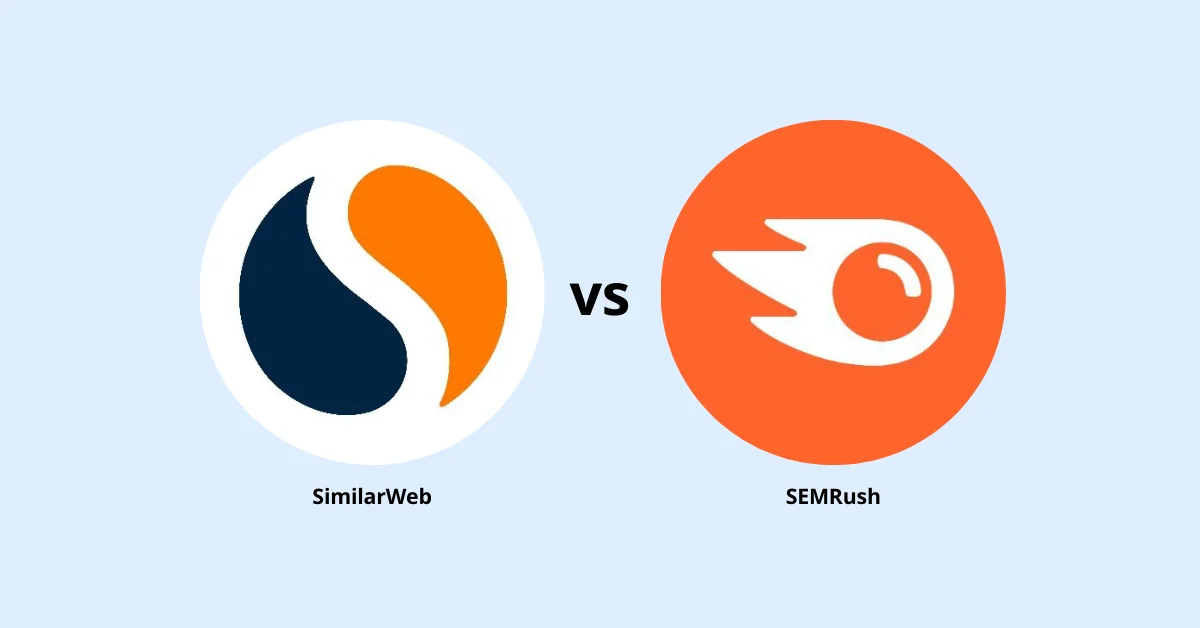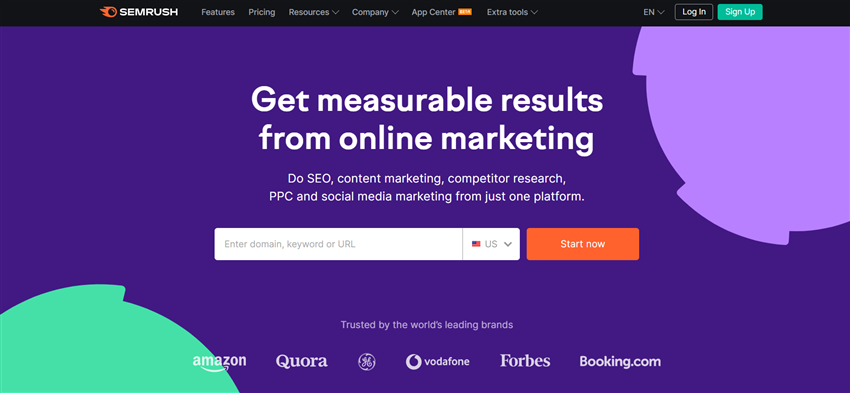Assessing your business’s online performance can’t happen without proper benchmarks – from overall market to competitive insights, you have to understand what others’ performance looks like.
Yet no one will share this kind of info – even if you’re competing against public companies, they don’t tend to reveal their traffic or conversion estimates. Hence, you have to turn to third-party tools that uncover what’s going on within your competitive landscape.
SEMRush vs SimilarWeb – Essential tools for SEO users!
Since Google alone manages 3.5 billion searches every day, saying that the Web is a “competitive field” will certainly be an understatement. Getting noticed is the only way to succeed these days.
You have to overcome competition, win first places in SERP – and the best way to do it? With humble SEO, of course!
For decades, keyword analysis, rankings monitoring, link analysis, etc. Have shaped the way sites are classified on SERP. The better the classification, the more traffic you will enjoy, which leads to more profit
The only hiccup? Doing quality SEO can be difficult. Some SEO strategies work better than others. While some simply do not, it is essential to do things right.
This brings us to…
SimilarWeb vs SEMRush – Build a winning SEO benchmark strategy today!
With powerful SEO tools such as SEMrush and SimilarWeb, designing effective SEO strategies is now easier than ever.
Just press a button and they will analyze everything about the keywords on your site (and your competitors) backlinks, the content, rankings, the errors, the benefits, and a ton of other complicated SEO measures and will bring you great benchmarks in an instant – we need to know because we often use them to improve our own sites.

SEMRush vs SimilarWeb – An introduction
Just for a little context and to help you refresh your memory, here is a brief overview of SEMrush and SimilarWeb ;
SEMrush
Founded at the end of 2008, SEMrush has come a long way since its modest beginnings as an internal tool – and all the credit must go to the huge portfolio of web applications it offers. It includes toolboxes for SEO, advertising, content marketing, social media management, competitive research, etc … yes, you name it, and SEMrush will have it.
We love SEMrush for :
- Revolutionary site audit and traffic analysis features
- Specialization in long-range keyword extraction and has the largest SEO keyword database anywhere in the world
- Integrated brand surveillance with real-time classification and monitoring of competitors
- Distribution table and analysis of the global CPC
- Live tracking of trend keywords
SimilarWeb
A versatile digital intelligence tool, SimilarWeb is known for its incredible suite of tools designed to help you analyze and monitor yours and the sites of your competitors. Currently, it has 250 employees in 8 global offices and was recognized as one of the 100 fastest-growing companies in Europe by red herring in 2015.
We love SimilarWeb for
- Easy to use, nice interface
- Full data analysis capacities for in-depth SEO monitoring and reporting on the field and competition
- Allows you to export data in PDF format in the free version. (png and excel for pro versions)
- Powerful keyword search tool for organic and PPC applications
- Analysis of the mobile applications sector
SEMRush vs Similar Web – Let’s talk about their functionality

With SEMrush and SimilarWeb adopting a similar modus operandi, the real differences come down to their main internal characteristics, their unique quirks, if you will. Below you can find a total and “detailed” breakdown of the same thing.
Let’s start ;
SEMRush vs SimilarWeb – Basic differences
As a SEO analysis tool, they both adopt different approaches: with SimilarWeb which becomes a competitive analysis tool, with tools allowing you to keep an eye on your business, as well as on your competitors, in general, follow possible SEO opportunities, and helps improve decision-making and the development of SEO strategies.
SEMrush, on the other hand, relies on a more holistic set of tools to manage the analysis of competitors. It offers largely the same advantages as SimilarWeb, but also extends its usefulness to other niches.
With both, you can get in-depth information on what your competitors, their best performing keywords, their backlinks, etc. are doing. in marketing; however, SEMrush exceeds its prowess while SimilarWeb simply misses it.
Do you know what is missing in SEMrush? A free variant – it is not offered at all. With SimilarWeb, you can take advantage of their toolless tool for three months, then with limitations.
With this, we have covered the most obvious differences.
Now let’s move on to the big ;
1) SEMRush vs SimilarWeb – The interface and the quality of the UX
SimilarWeb is loaded here with its magnificent simple interface to use. Navigation is intuitive and the interface itself was quite simple. Whether you are an expert or a beginner, you will have no problem. SEMRush IU is also very good. But compared to SimilarWeb, it’s just not there yet.
With SEMrush, everything is labeled, which is not the case with SimilarWeb. Again, the colorful user interface developed quickly on us. Is it crowded? Yes – but they executed the design in a way that seems new, even refreshing.
Overall, SimilarWeb wins this one-mile round. Of course, you have to get used to it. But beyond that, many will agree that it is the best choice.
2) SimilarWeb vs SEM Rush – Competitive analysis
Long considered one of the simplest ways to give a “new life” to your SEO game in terms of competition analysis, we are happy to announce that SEMrush and SimilarWeb is excellent in this regard.
To begin with, SEMrush reigns here with its wide range of organic research tools that can define your rival’s SEO strategies in an instant. It monitors, analyzes, and provides data on backlinks, main keywords, rankings, etc. of your rival, which allows you to rip off their winning SEO formulas and use them as yours.
With SimilarWeb, you will get all of the above and more. Through the integrated domain comparison, find out how your site compares to its competitors. It can find keywords trends, follow the ranking of your competitors and decrypt their traffic rates. Heck, it even scans your audience, making it easier for you to find potential publishers, excellent affiliates, traffic and screening lists.
Overall, when it comes to competitive analysis, they both work fairly well, although SimilarWeb clearly has the upper hand with its more robust analytical benefits. Other than that, you will do very well with one or the other.
3) SimilarWeb vs SEMRush – Analysis of keywords
With the search for keywords, the SEMRush vs SimilarWeb match again proved to be a very spectacular battle, both also proving their courage. With everything, CPC, volume, difficulty, popularity and more (with filters, nothing less), the two tools make it easier to find great keywords for all of your SEO strategies. Just enter the keyword SEED and voila! You will be treated with thousands of keywords in a jiffy.
So far, everything is the same with both – but from there, especially with the difficulty of the keywords SEMRush vs SimilarWeb, they are very different beasts.
With SEMrush, tracking keywords was a better experience, as it followed and updated new keywords every day, unlike weekly updates from similar websites. And since it had a global scope, the keywords were also much more versatile. Another factor in favor of SEMRush is the precision of his keyword suggestions.
The analysis of SimilarWeb’s keywords, to begin with, is quite simple. You get the familiar tropes like high volume lists, contextual suggestions, etc … by increasing by one notch; you can sort the keywords by difficulty, volume, traffic, etc … directly from the dashboard. To top it off, it even helps you find the right destination pages for your keywords.
As you can see, SEMRush and SimilarWeb are excellent in this regard. They both performed very well in all areas.
Yeah, let’s call this one a tie.
4) SEMRush vs SimilarWeb – Backlink and its analyzes
Again, SEMRush and SimilarWeb also highlighted this crucial factor of SEO. But overall, there is a winner here. And his SEMrush. Do not mistake yourself! SimilarWeb has many backlinking capabilities. But when it comes to execution, we found SEMRush more refined – there is no lag at all during the phishing of backlinks.
In addition, SEMrush opens the door to more in-depth information on the current backlinks of your sites, their health, how to generate new ones, follow the best backlinks of your rivals, their kindness, etc., which greatly facilitates progression through SERP .
Yes, SimilarWeb also has all of the above functionality – we know that. But when it comes to reliability, SEMrush chased him out of the park.
5) SEMRush vs Similar Web – Analysis of social media
No modern SEO tool will ever be complete without good social media analysis functionalities. And the guys from SEMrush and SimilarWeb know it.
First, we have SEMrush. Adopting a limitless approach, the integrated social media tracker not only manages and monitors your presence on social networks, but also your competitors. You can demystify what they do on SM, the content they publish, their most effective SM practices, etc. – In other words, SEMrush offers almost all the critical metrics to boost all your campaigns on the SEO.
On the other hand, SimilarWeb does not exactly have a strategy of SEO on social networks. The furthest it offers with regard to social media is traffic analysis. However, you can perform a basic SM analysis, such as finding the traffic assessments associated with a specific site.
Used correctly, reports can disclose the total number of visits from social sources, the social pages referred, the corresponding traffic shares and even the potential SM marketing opportunities
If the above exam was not clear enough, SEMrush wins these rounds hands down. SimilarWeb still has a long way to go here.
SEMRush vs SimilarWeb – Finally, it’s time to discuss plans and prices!
With the two taking the affordable route, SEMrush and similar Web. However, it adopts different approaches to the pricing of their plans, one being priced by level while the other is priced by quotes.
Well, let’s take a closer look then ;
SEMRush
Armed with three fixed price plans and a customizable business edition for large companies/agencies, the cheapest plan called “Pro” begins at $ 99.95 for one month and is available for $ 83.28 if billed annually.
Aimed mainly at small and medium-sized enterprises, the next plan is “Guru”. Usually, it will cost you $ 199.95 a month. But if you want to save $ 400, you can opt for its annual version, at the price of $ 1999.40.
Then we have the business plan, which is mainly aimed at companies with a huge footprint, such as e-commerce sites, advertising agencies, etc. you can now get it for $ 399 a month or $ 3999 if you agree with the billing.
Finally, SEMrush also offers premium “deposit-based” packages for business users with additional needs.
To find out what these plans offer and the differences between them, we advise you to consult their site, because they often change things.
Unfortunately, there is no free version for SEMrush. But there is a free 14-day trial that you can use to assess their premium plans.
How to get free access to SEMRush Pro?
Yes, I said well. You can access the premium functionality of SEMRush for free. Here is an exclusive offer to use SEMRush Pro for 14 days free of charge.
Step 1: Click this special link to access the SEMRush & Traffic Crow co-branding page. Then click ‘Start your free 14-day trial now! “.
Step 2: Then you will need to create a free SEMRush account using your email address. If you already have one, just log in using the connection information.
Step 3: Once created, you are almost done with the SEMRush 14-day Pro test plan. Just enter the billing details to pay. You can see the promo code applied directly.
Step 4: Click on “Pass the command”. You can now access the functionality of SEMRush Pro for 14 days free of charge.
It must be a golden opportunity to test a legendary SEO tool in the industry that does not spend a penny at all (which is worth $ 99.95).
Indeed, at any time you can cancel your account by contacting the SEMRush team via mail@semrush.com. I bet you don’t withdraw your account once you start reaping the benefits.
SimilarWeb
With SimilarWeb, things are a bit complicated because there is no fixed range of plans from which you can choose. Instead, they follow a quota price system, which means you will only have to pay based on the services you use. The foreground, of course, is a free variant, which you can usefully for the first three months.
The upgrade moves you to the Company package, which consists of personalized plans. Yes, instead of attaching yourself to a single plan that often has additional features that you may not even need, SimilarWeb allows you effortlessly to create specific SimilarWeb plans with only features that you will end up using every day, therefore, it can save you a ton of money, especially in the long run.
As part of the Business plan, you can choose from ;
Multiple users, unique visitors, sector analysis, keyword analysis, popular pages, engagement with mobile applications, global and country-specific data, up to 3 years of web traffic data, up to 28 months of mobile applications data and unlimited metric results.
On average, expect to pay from $ 299 to $ 1,499 per month depending on your needs.
SimilarWeb vs SEM Rush – Frequently Asked Questions
Now that you know all about their differences, their benefits and their problems, it’s time for a quick FAQ session on SimilarWeb vs SEM Rush. If you are reluctant to buy one or the other, the answers below may help you make the choice.
After all, an informed customer is the best type of customer, no?
Let’s start
In all honesty, it’s a subjective choice. If you want an affordable, hassle-free SEO tool with almost all the benefits, opt for SEMrush. SimilarWeb, on the other hand, is ideal for those who want a little more flexibility with their SEO tools, because it allows upgrades and downshifts with their integrated tools according to your needs and your exact budgets.
Simply put, the choice is yours: consider your needs, desires, and budgets for SEO and choose the tool that best suits you.
With SEMrush, you will have access to a free trial for 14 days, while SimilarWeb offers a limited free edition which you can use indefinitely.
With either, you will not get any advanced SEO functionality. Use them to familiarize yourself with the tools before upgrading.
Absolutely! Although we did not mention it in the review, they both offer excellent tutorials and guides that will help you better enjoy their benefits. And well, even if you are wrong, their customer service teams are still there to help you – 24/7/365
From my experience, I found that SimilarWeb was a little better than SEMRush in terms of competitive analysis. The reports are more detailed and also allow in-depth comparisons between more than 5 areas at the same time.
What is the best: SimilarWeb or SEMrush?
When you consider SEMRush vs SimilarWeb, a simple glance is more than enough to tell you that SEMRush is far superior to SimilarWeb on almost all accounts, thanks to the additional site audit toolbox, the tool magic keywords / PPC, etc. site analysis via its site audit tool, which quickly helps to identify potentially critical SEO problems and instantly suggests possible solutions.
As part of the Similar Web defense, you will get advanced and detailed details on the analysis of web pages and sessions. And it also offers a free variant, without forgetting that you can adjust the costs according to your specific needs.
And now? You are the judge. Read the comparison, review your business goals and find out which tool will work best for your SEO needs.




